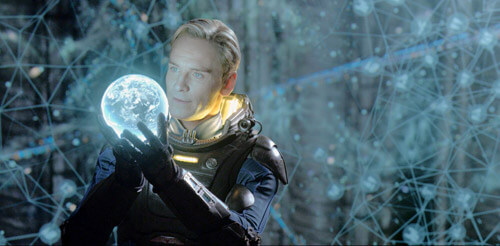“Prometheus”
Very Good (3 Stars)
Rated R for intense violence and brief profanity.
Running time: 123 minutes
Distributor: 20th Century Fox
Dateline: Scotland, 2089. While spelunking along the shores of the Isle of Skye, archaeologists Charlie Holloway (Logan Marshall-Green) and Dr. Elizabeth Shaw (Noomi Rapace) discover an ancient painting etched into the ceiling of an abandoned cave. The uncanny researchers immediately discern that the primitive picture is an invitation from aliens to visit a moon located in a remote constellation that might very well have been the birthplace of humanity.
Fast-forward a few years and we find the curious couple already en route to LV-233 on a daring expedition to find proof that people were created not by God but genetically engineered by sentient beings from another galaxy. It is unclear how unearthing such evidence will affect the faith of Dr. Shaw, a devout Christian who always wears a cross that was a gift from her late father (Patrick Shaw).
As the spaceship “Prometheus” approaches its destination, Captain Janek (Idris Elba) and his crew of sixteen are roused from a cryogenic state of hibernation by a doting, concrete blond android named David (Michael Fassbender). Upon landing, however, command of the operation is assumed by Meredith Vickers (Charlize Theron), a coldhearted, corporate executive employed by Weyland Corporation whose late CEO (Guy Pearce) underwrote the trillion-dollar mission.
The trip is just a job to the jaded Vickers who is skeptical about what she refers to as “the scribbling of dirty little savages in caves.” In fact, she orders the disembarking explorers to refrain from making any direct contact with aliens.
Of course, contact with alien life forms is precisely the point of Prometheus, a high body-count, horror flick directed by three-time, Oscar-nominee Ridley Scott (for Gladiator, Black Hawk Down and Thelma & Louise). At this juncture, the picture proceeds to divide its time between raising probing philosophical questions about the intersection of science, religion and ethics, and gratuitous graphic depictions of body invasion, mutation, and gruesome vivisection.
Although initially conceived as a prequel to Alien (1979), also directed by Scott, the movie was ultimately released as a stand alone adventure. Regardless, this riveting, visually-captivating and thought-provoking sci-fi is well-enough executed to recommend for avid sci-fi fans, even if the heavy-handed, faith-based symbolism (“Where’s my cross?” and “After all this, you still believe!”) gets to be a bit much.
A thinly-veiled intro to the Alien franchise revising that classic’s tagline to suggest: In space, no one can hear you scream, except perhaps God.

























